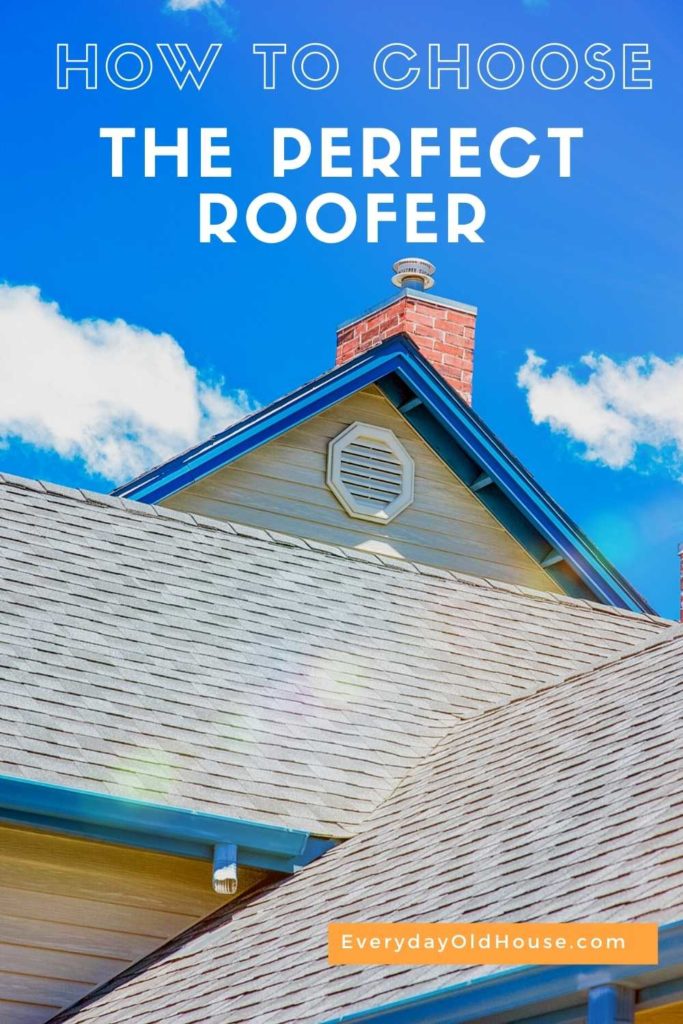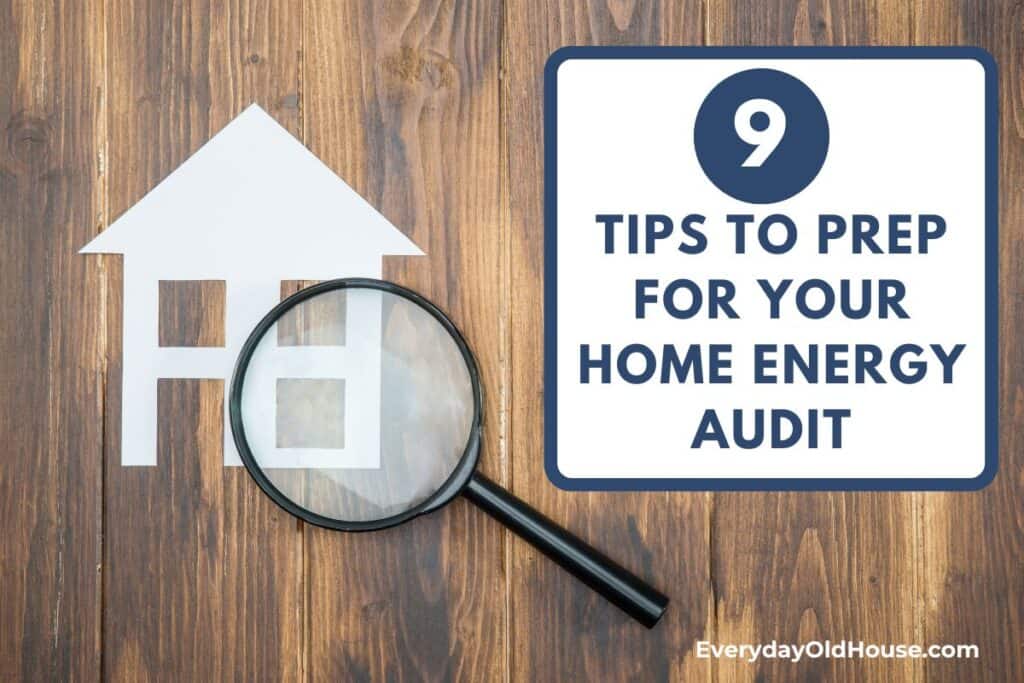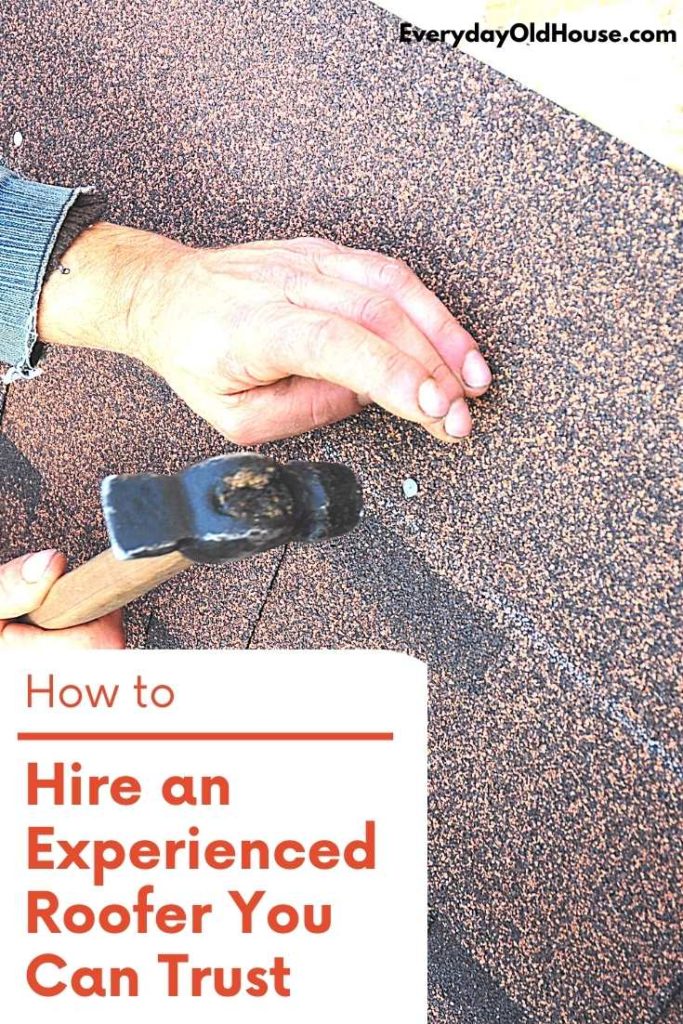The average residential roof needs replacement about every 30 years. The advantage? Most homeowners spend money on a new roof maybe 2-3 times during their lifetimes. And that’s good news, since roof replacement is one of the most expensive home improvement projects. The disadvantage? We lack experience in finding a reputable roofer we trust to correctly fix or replace our home’s roof.
So how exactly do we homeowners find a reputable roofer for our homes?
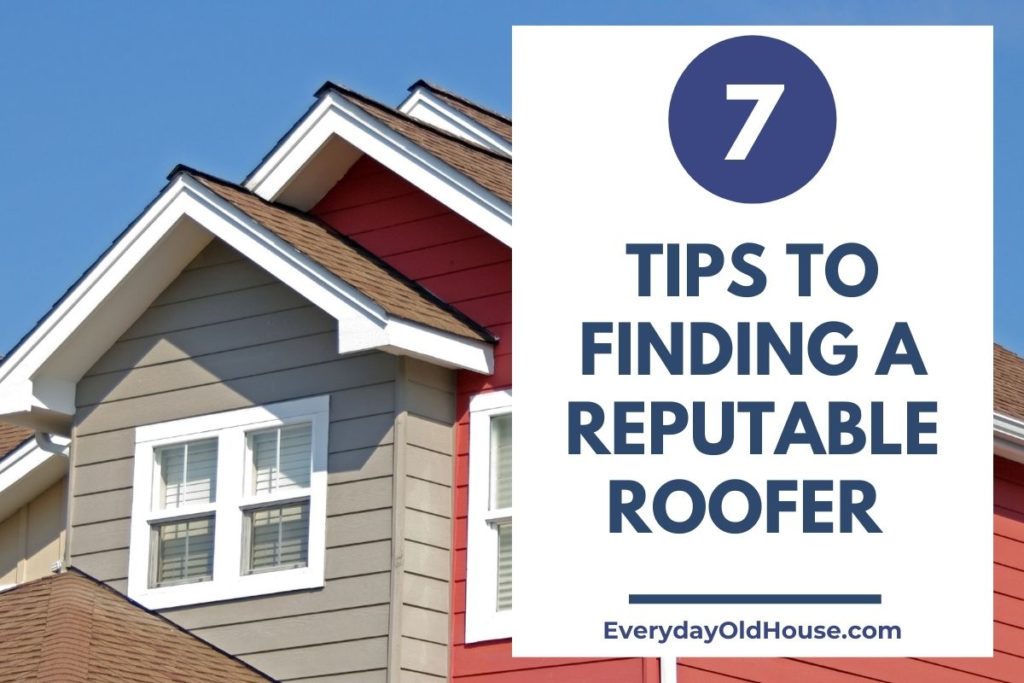
Backstory
Why am I researching how to find the reputable roofer? Quite simply, we have the common problem with old houses is that we needed a new roof for our home. Replacing our roof is a home improvement project we only want to do once. And considering the expense, we want to do it right.
I researched guidance from these diverse group of home industry experts with tips on finding a reputable roofer, including:
- GAF – one of the largest home roofing shingle and material manufacturers
- Angie’s List – home improvement contractor review websites
- Elevated Roofing and Heidler Roofing – boots-on-the-ground home roofing contractors
- Farmer’s Almanac – trusted homeowner reference for over 200 years
Guide to Finding a Reputable Roofer
1. Stay Local
Hire a home roofing contractor with a local presence. Confirm they have an established, brick-and-mortar business nearby. A physical mailing address is good, a Post Office (P.O.) Box is a huge red flag.
Why is a local presence important? If you have a problem with your roof in 5 or 10 years (especially if your roof is still under warranty), you want to be able to track down your roofer. And if they are located in a distant city or state, it may be impossible to get them to come to your home and correct any mistakes or issues.
In addition to being able to more easily contact, there are several other reasons to pick a local roofer, such as:
- Less chance of potential issues or scams (roofers are looking to maintain a good reputation within their community)
- More familiar with local building codes and regulations
- Stronger relationship with local material supply companies
- Ability for more face-to-face meetings with you and get all your questions answered
2. Research and Verify Roofing Referrals
Getting referrals from friends and neighbors is a tried-and-true method of finding a reputable roofer. Reach out to them and ask – within the past few years, have you replaced your roof?
Word of mouth isn’t the only way to gain a sense of workmanship and reliability. Places to look online for quality referrals, include:
- Better Business Bureau or BBB– first make sure they actually exist in the BBB database as well have acceptable score and ratings
- Community social media/ Facebook pages
- Contractor review sites, such as Angie’s List or HomeAdvisor.
Once you create a list from these sources, the referrals don’t stop there. When you reach out to a contractor to request an estimate, ask for customer testimonials. Request names and contact info of homeowners who have worked with that roofer.
Drive by the house to see the new roof. Reach out to the homeowners and ask at a minimum a few questions, including:
- Did the roofer repair or completely replace the roof?
- Were they happy with the job done?
- Would they hire that contractor again?
3. Verify Proper Licensing and Insurance
Any reputable roofing contractor will have insurance for all its employees and subcontractors. Why is that important to you? If the roofer has insufficient insurance and a roofing employee gets injured on your property, YOU could get dragged into a lawsuit.
Doesn’t sound very fun, so protect yourself by ensuring your roofer is fully insured.
Ask your contractor for certificates for these two types of insurance:
- Worker’s Compensation
- General Liability
Check the certificate for the limits (i.e. dollar amount insured). Most contractors should have at least $1million limit (or higher) each in both types of insurance.
If they don’t, this could mean a few things, most not good from your standpoint. For example:
- The roofer could be a start-up or newer company and couldn’t afford the full $1m limit. Which makes you wonder if the roofer is cutting corners elsewhere….
- Or the insurance company refused to give them a higher limit due to something they weren’t comfortable with. And if a big insurance company with standardized protocols and procedures doesn’t trust the roofer, should you?
Note that some contractors will hire subcontractors to handle parts of the roofing job. Ask the contractor if they use subcontractors, and if so, verify that these subs also carry the same (or better) insurance.
In addition to insurance, ask the contractor for a copy of their state license. Most states require roofing contractors to be licensed in that state to legally work.
4. Educate Yourself
As with all components of your house (i.e. heating, cooling, electrical, plumbing, etc…), a responsible homeowner should know the basics of how their homes work. And that includes your roofing system. I know, I know, that might sound boring, but #adulting.
By understanding the basics of a roofing system, you have better odds on separating out the quality, trustworthy roofers from the, well, let’s call them the less ingenuous roofers.
By understanding the basics of roof components and the roof replacement process, I could better follow a conversation with the roofing contractors who visited our house to evaluate our roof and provide quotes.
Here’s a few resources that I found helpful.
Anatomy of a Roof
I found this amazing Roofing 101 post by Beck Roofing Company in Hayward, CA that details the different parts of a roof. Honestly, I had no idea there were do many parts to a roof! Naively, this first-time homeowner thought that a roof just consisted of shingles. Oh no! That is DEFINITELY not the case!
Here’s two roofing diagrams that provided great visuals of home roofing systems.
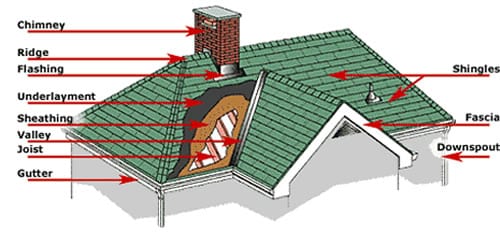
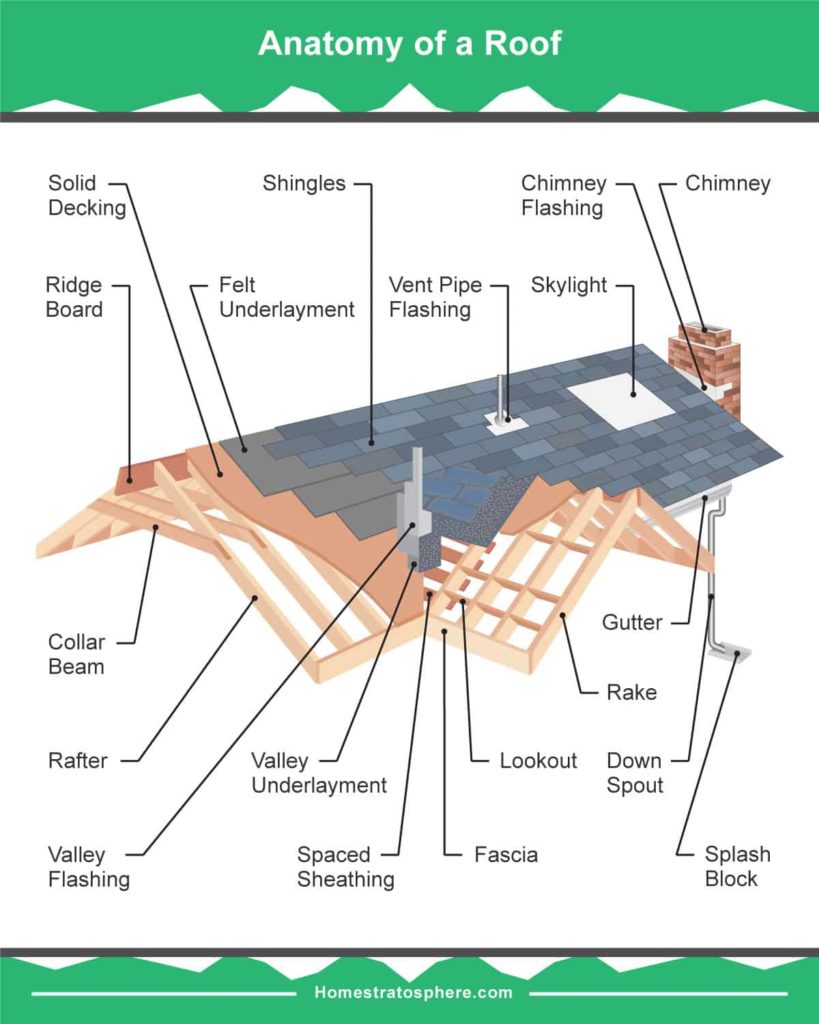
Process of Replacing a Roof
Once you have a handle on the basic anatomy of a roof, next understand the basic process of roof replacement. Why? It will help you identify the roofers who plan to cut costs and sell you an incomplete roofing system, versus the roofer that will give you a comprehensive system that will last for decades.
Here’s a video that I thought explained the process very thoroughly:
5. Demand Written Proposals
When looking for a contractor to replace or repair your roof, require a written estimate. HUGE red flag if the roofer doesn’t provide a proposal unless in writing. It’s a simple as that.
No written estimate? Then cross that contractor off the list. (FYI – As a rule of thumb, get at least 3 written estimates.)
Note that roofers usually provide a written estimate or quote, but some provide “bids”. What’s the difference? An estimate is the roofer’s best guess on what a job will cost (the final cost could be lower or higher), while a bid is a fixed amount to complete the job.
6. Confirm Roofing Warranties
New roofs are a substantial investment. And they are meant to last. But sometimes they don’t. A new roof should come with a written, comprehensive warranty that spells out exactly who is paying the bill if your roof starts leaking 2 years after being installed.
Reliable, reputable roofers will disclose what type of warranties accompany their written estimate of job cost. And they also should willing to discuss situations where past customers ran into a problem and needed to trigger their warranties. And what the roofer did to fix the situation.
Note that new roofs usually come with two types of warranties
- Manufacturer Warranty – i.e. covers the physical roofing materials
- Workmanship Warranty – i.e. covers the installation
While I’d rather poke my eyes out with a dull pencil versus reading warranties, I know it’s important to have a written warranties for my new roof. And that those warranties provide clear terms and conditions.
7. Price Isn’t Everything
You get what you pay for. It’s as simple as that. Shop solely on price, and you’ll probably regret it. Be prepared for a leaky roof and a contractor who won’t stand by his warranty. Which forces you to spend more money to fix a leaking or subpar roof.
In the long run, isn’t finding a reputable roofer that may cost a few more dollars now worth peace of mind that you will have a sturdy roof over your head?
If you receive a significantly low estimate, proceed with caution. Low-ball estimates are red flags.
If the roofing contractors are within 10-20% of each others, the lowest bid may be acceptable. But you should do further research on that contractor and dig into the quotes.
Next Step
Now that you have identified a handful of reputable roofers and have collected estimates, what is the next step? Sitting down, interpreting the quotes and picking the best one.
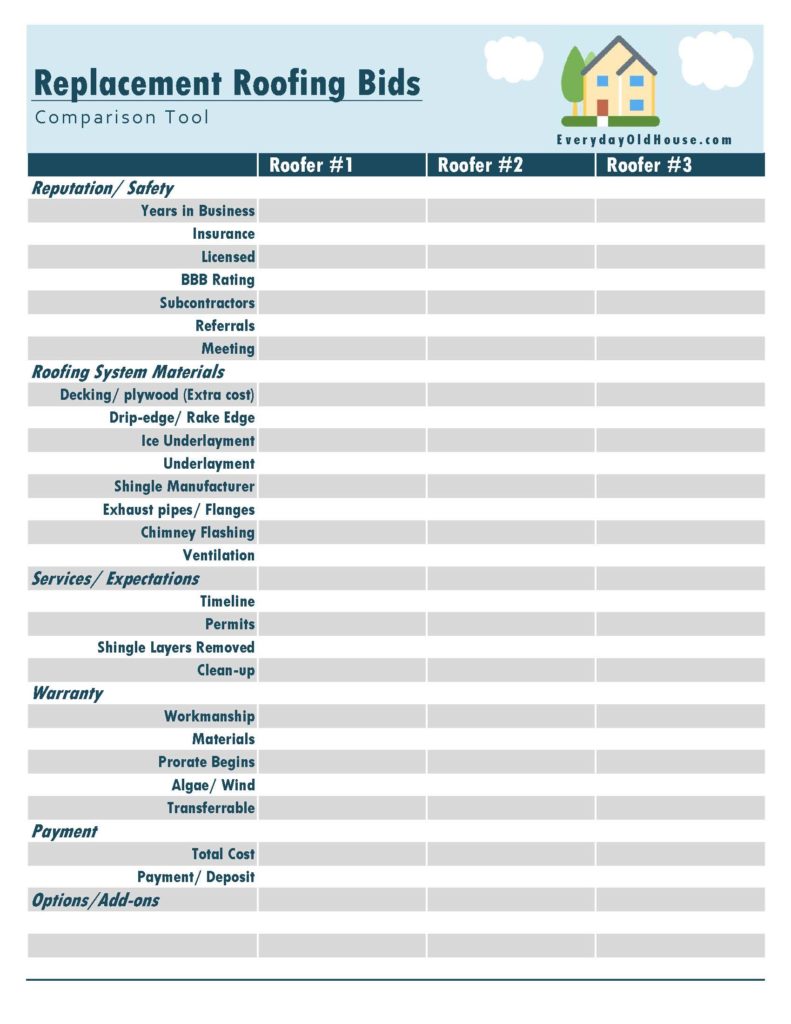
Related Posts
Want to be the first to know about new posts? Be sure to follow me on Pinterest, Facebook, Instagram or Twitter of even Etsy! Or better yet… Subscribe below!
My monthly (admittedly sometimes more, sometimes less….) emails are like receiving a unexpected letter from an old friend WITHOUT needing to put on your slippers and walk out to your mailbox…. See? I got ya, my friend!)
[Note: My posts are proudly connected to these amazing link parties full of DIY ideas and inspiration!]
